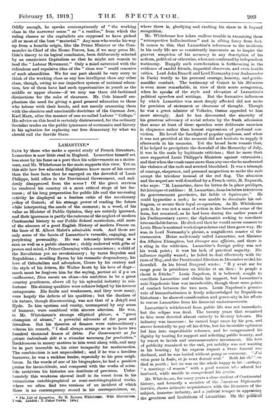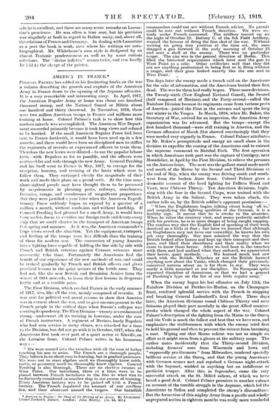LAMARTINE.*
Savor by those who make a special study of French literature, Lamartine is now little read in England. Lamartine himself set lees store by his fame as a poet than his achievements as a states- man, and Mr. Whitehouse in the main supports this view. Yet on this side how few educated Englishmen know more of his career than the bare facts that he emerged on the downfall of Louie Philippe, held office in the Provisional Government, and sud- denly disappeared from the scene t Of the great services he rendered his country at a most critical stage of her for- tunes ; of his long preparation for public life and the unceasing activity he displayed as a fearless critic of the reactionary policy of Guizot; of his strange power of reading the future while interpreting the needs of the moment ; in a word, of his value as Minister of Public Opinion, they are entirely ignorant, and their ignorance is partly the outcome of the neglect of modern Continental history in our Public School curriculum, still more of the absence of a good English History of modern France on the lines of M. Albert Millet's admirable work. And these are only some of the facets of Lamartine's versatile, engaging, and perplexing personality. Ho was intensely interesting as a man as well as a public character ; richly endowed with gifts of person and mind, a Prince Charming with a conscience ; a child of the Revolution yet no revolutionary ; by turns Royalist and Republican ; recalling Byron by his romantic despondency, his love of Orientaliem and adventure, Cicero by his oratory and the style of his letters, Sir Walter Scott by his love of dogs— much meet be forgiven him for the saying, putout od it p a un rnalheuretex, Dieu ewe% un chien—his ambition to be a great country gentleman, above all by his splendid industry in mis- fortune. His shining qualities were acknowledged by his keenest antagonists. His faults and weaknesses, and they were many, were largely the defects of his qualities ; but the dualism of his nature, though disconcerting, was not that of a Jekyll and Hyde. In him egotism and vanity, ruitempered by any sense of humour, were combined with sincere altruism. He was, in Mr. Whitehouse's strange elliptical phrase, a "great champion of abuses," a powerful advocate of the poor and friendless. But his theories of finance were extraordinary ; witness his remark, " I shall always arrange so as to have two hundred thousand francs of debts. For Governments as for private individuate debt is a etimulua necemary for production." Recklessness in money matters in him went along with, and may be in part traceable to, his utter incapacity for mathematics. The combination is not unparalleled ; and if he was a heedless borrower, he was a reckless lender, especially to his poor neigh- bolus. In the words of one of his biographers, he had a positive genius for inexactitude, and compared with the works of scien- tific archivists his histories are destitute of precision. Unfor- tunately this weakness showed itself in its worst form in his voluminous autobiographical or semi-autobiographical works, where we often find two versions of an incident of which there is no contemporary record in his correspondence, or, • TA. Life of forsortine. By H. Remsen Whitehouse. With Blustrations. vol. London: T. Elsner yawl. 142e.1
where there is, glorifying and exalting his share in It beyond recognition.
Mr. Whitehouse has taken endless trouble in examining these "retrospective hallucinations" and in sifting fancy from fact. It comes to this, that Lamartine's references to the incidents in his early life are so consistently inaccurate as to inspire the gravest suspicion of his accuracy in any description of his actions, political or otherwise, when not confirmed by independent
testimony. Happily such corroboration is forthcoming in the evidence of candid friends, impartial observers, and even hostile critics. Lord Joint Russell and Lord Normanby (our Ambassador in Paris) testify to his personal courage, honesty, and gentle- manlike conduct. The testimony of Guizot in hie Memoiree is even more remarkable, in view of their acute antagonism,
when he speaks of the style and elevation of Lantartine's
political speeches and writings. But the formative influences by which Lamartine was most deeply affected did not make
for precision of statement or clearness of thought. Though he was a great admirer of Voltaire, 086111 appealed to him more strongly. And he has discounted the sincerity of his generous advocacy of social reform by the frank admission that some at least of these speeches were deliberate exercises in eloquence rather then honest expressions of profound con. viction. He loved the limelight of popular applause, and when it was not provided at the moment did not hesitate to supply it afterwards in his memoirs. Yet the broad facts remain that, if he helped to precipitate the downfall of the Monarchy of July, it was in the main by legitimate criticism ; that he more than once supported Louie Philippe's Ministers against extremists; and that when the malt came more than any one else he moderated the violence of the mob and averted bloodshed. It was a triumph of courage, eloquence, and personal magnetism to make the mob accept the tricolour instead of the red flag. The situation and the sequel are well described by a French critic, M. Regnault, who says: "M. Lamartine, dans lea luttea de la place publique, fut heroique et sublime : M. Lamartine, dam lee luttee interieures du gouvernement provisoire, fut faiblo et equivoque." He could hypnotize a mob ; he was unable to dominate his col- leagues, or secure their loyal co-operation. As Mr. Whitehouse puts it, he was not a man of action in the broadest sense of the term, but remained, as ho had been during the earlier years of his Parliamentary career, the diplomatist seeking to conciliate irreconcilable forces. He declared that he would never consent to Louis Blanc's national workshops scheme and then gave way. He was, in Lord Normanhy's phrase, a magnificent master of the ceremonies. Heine maliciously called Lamartine, not Ministre dee Affairs Etrangeree, but eiranger our affairee, and there is a sting in the witticism. Lamartine's foreign policy was not his weak point ; it was his lack of practical sagacity. Ifis influence rapidly waned ; he failed to deal effectively with the riots of May, and the Presidential Election in December sealed his downfall. As his friend Dargaud wrote: " II y avail cur lee range pour la presidence un fetiche et un dieu : le peuple a choisi le fetiche." Louis Napoleon, it is believed, sought to conciliate Lamartine and obtain his support, but Lamartine's anti-Napoleonic bias was ineradicable, though there were points of contact between the two men. Louis Napoleon's genuine vein of humanitarianism is freely acknowledged by Republican historians : he showed consideration and generosity in his efforte to rescue Lamartine from his financial embarrassments.
Lamartine's withdrawal from public life was not immediate, but the eclipse was final. The twenty years that remained to him were devoted almost entirely to literary labours. His industry was immense : he earned huge sums by his pen, and strove heroically to pay off his debts, but his incurable optimism led him into unprofitable schemes, and he compromised his dignity by touting for support and soliciting public bounty, and by resort to lavish and unremunerative investment, His love of publicity remained to the end, yet nobility was not wanting in his bearing ; by his express request a State funeral was declined, and he was buried without pomp or ceremony. " J'ai Wm pour Is fouls, et je veux dormir seal." Both his chi7.!.en died in youth : but he was on the whole happy in his marriage, " a marriage of reason " with a good woman who adored her husband, while unable to comprehend his genius. Mr. Whitehouse, for many years a close student of Continental history, and formerly a member of the American Diplomatic shows intimate acquaintance with the literature of the aSubareccet, immense industry, and a judicial temper in appraising the greatness and limitations of Lamartine. On the political! side he is excellent, and there are many acute remarks on Lamar- tine's prescience. Ho was often a true seer, but his prevision was singularly at fault in regard to Italian unity, and, above all, the relations of France and Germany. In dealing with Lamartine as a poet the book is weak, save where his writings are auto- biographicaL Mr. Whitehouse's own style is disfigured by an Minuet Teutonic ponderousness as well as by same curious soleeisma. The "divine inflates" occurs twice, and can hardly be laid t, the cherge of the printer.



































 Previous page
Previous page